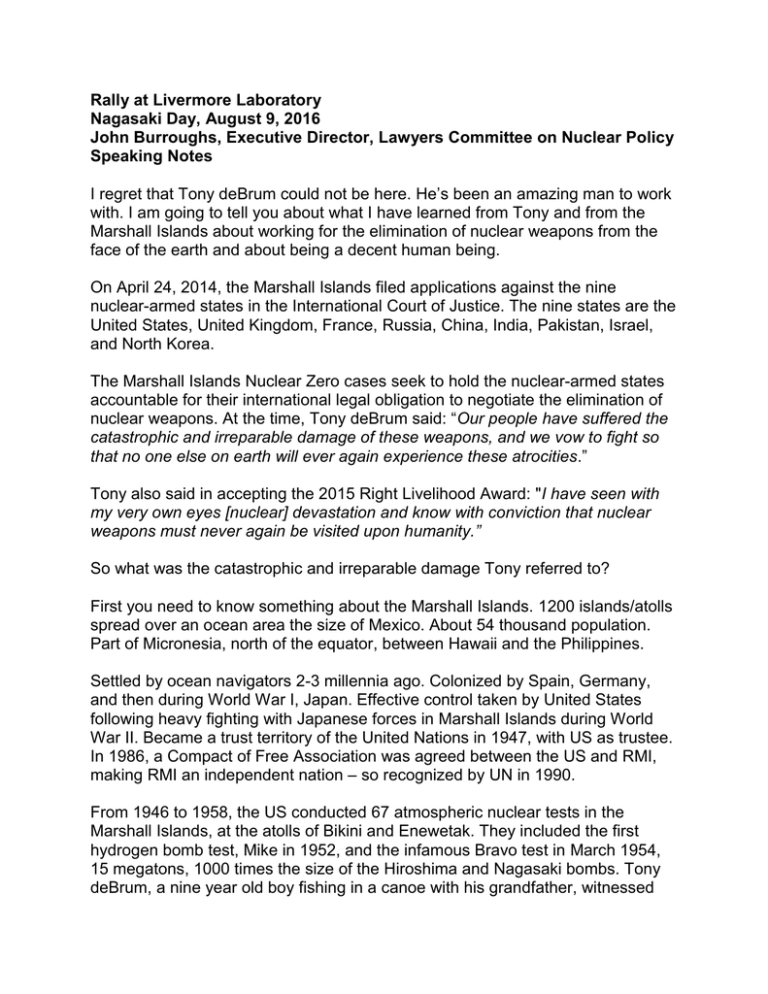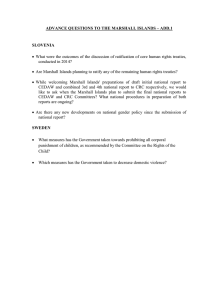Rally at Livermore Laboratory Nagasaki Day - Tri
advertisement

Rally at Livermore Laboratory Nagasaki Day, August 9, 2016 John Burroughs, Executive Director, Lawyers Committee on Nuclear Policy Speaking Notes I regret that Tony deBrum could not be here. He’s been an amazing man to work with. I am going to tell you about what I have learned from Tony and from the Marshall Islands about working for the elimination of nuclear weapons from the face of the earth and about being a decent human being. On April 24, 2014, the Marshall Islands filed applications against the nine nuclear-armed states in the International Court of Justice. The nine states are the United States, United Kingdom, France, Russia, China, India, Pakistan, Israel, and North Korea. The Marshall Islands Nuclear Zero cases seek to hold the nuclear-armed states accountable for their international legal obligation to negotiate the elimination of nuclear weapons. At the time, Tony deBrum said: “Our people have suffered the catastrophic and irreparable damage of these weapons, and we vow to fight so that no one else on earth will ever again experience these atrocities.” Tony also said in accepting the 2015 Right Livelihood Award: "I have seen with my very own eyes [nuclear] devastation and know with conviction that nuclear weapons must never again be visited upon humanity.” So what was the catastrophic and irreparable damage Tony referred to? First you need to know something about the Marshall Islands. 1200 islands/atolls spread over an ocean area the size of Mexico. About 54 thousand population. Part of Micronesia, north of the equator, between Hawaii and the Philippines. Settled by ocean navigators 2-3 millennia ago. Colonized by Spain, Germany, and then during World War I, Japan. Effective control taken by United States following heavy fighting with Japanese forces in Marshall Islands during World War II. Became a trust territory of the United Nations in 1947, with US as trustee. In 1986, a Compact of Free Association was agreed between the US and RMI, making RMI an independent nation – so recognized by UN in 1990. From 1946 to 1958, the US conducted 67 atmospheric nuclear tests in the Marshall Islands, at the atolls of Bikini and Enewetak. They included the first hydrogen bomb test, Mike in 1952, and the infamous Bravo test in March 1954, 15 megatons, 1000 times the size of the Hiroshima and Nagasaki bombs. Tony deBrum, a nine year old boy fishing in a canoe with his grandfather, witnessed the Bravo test from 200 miles away. The sky turned blood red, he told the International Court of Justice this March. Rongelap atoll exposed. The atoll was evacuated. Once resettled, then evacuated again due to radioactivity. Lijon Eknilang testified to the International Court of Justice in 1995: “[W]omen on the island have given birth to babies that look like blobs of jelly. Some of these things we carry for eight months, nine months. There are no legs, no arms, no head, no nothing. Other children are born who will never recognize this world or their own parents. They just lie there with crooked arms and legs and never speak.” According to a 2004 report of the US National Cancer Institute, cancers resulting from the testing are still to be developed and diagnosed. The Marshallese sought compensation in the US courts, in serious cases. But those claims were relinquished as part of the Compact of Free Association, which provided $150 million for compensation for health and environmental effects, and loss of land. A tribunal established by the Compact later found over $2 billion is due. But Congress has refused to appropriate more than the initial $150 million. However, the cases brought by the Marshall Islands in the International Court of Justice do not seek compensation for the effects of nuclear testing on the Marshallese. Like the hibakusha, the Marshallese are rising above the injuries they have suffered to act on behalf of humankind. Never again, they, like the hibakusha, are saying. And never again requires the global elimination of nuclear arsenals. Let me briefly explain the claims in the cases and the state of the proceedings. The Nuclear Non-Proliferation Treaty requires almost all states in the world not to acquire nuclear weapons, and in Article VI obligates the nuclear-armed states parties (US, UK, France, Russia and China) to pursue negotiations in good faith on effective measures related to cessation of the nuclear arms race at an early date and to nuclear disarmament. In its 1996 Advisory Opinion on the legality of nuclear weapons, the International Court of Justice interpreted Article VI of the NPT and unanimously declared the obligation to pursue in good faith and conclude negotiations leading to nuclear disarmament in all its aspects under strict and effective international control. The court’s formulation of the obligation and its analysis compel the reading that the obligation applies universally, including to states not party to the NPT, India, Pakistan, Israel, and North Korea. 2 The Marshall Islands’ claims are based upon the ICJ’s declaration of the nuclear disarmament obligation in the 1996 opinion. The Marshall Islands’ initiative comes at a time when there are no negotiations on cessation of the nuclear arms race and nuclear disarmament. Aside from modest US-Russian bilateral agreements on reductions, that has been the case for many years, dating back to the 1996 Comprehensive Nuclear-Test-Ban Treaty. Moreover, all nuclear-armed states are planning and spending to maintain and modernize their nuclear forces for decades to come. In the Marshall Islands’ contention, this planning and spending shows a lack of good faith in meeting the obligation of negotiating nuclear disarmament – and good faith is itself a legal requirement. Three nuclear disarmament cases brought by the Marshall Islands against India, Pakistan, and the United Kingdom are now being actively litigated before the ICJ. That is because those three countries have generally accepted the jurisdiction of the Court by filing declarations with the Court. The Marshall Islands also filed applications against the six other nuclear-armed states (China, France, Israel, North Korea, Russia, and the United States), but none of them have current declarations on file accepting the court’s jurisdiction. They have ignored or, in the case of China, declined the Marshall Islands’ requests that they come before the court in the matter. The United States in the 1950s filed a declaration accepting the jurisdiction of the Court, but withdrew the declaration after Nicaragua brought a case in the 1980s claiming that US support of the contras violated international law. The US position vis a vis the ICJ, and its refusal to voluntarily come before the Court in the case brought by the RMI, are part of a pattern. The US has not ratified the treaty establishing the International Criminal Court; has not ratified the Comprehensive Test Ban Treaty; has not ratified the Law of the Sea Convention; and not joined the treaties banning landmines and cluster munitions. This US approach to international institutions and treaties will have to change if the abolition of nuclear weapons is to be accomplished. The Marshall Islands has tried another strategy in relation to the United States. At the same time the application as filed against the United States and other states in the ICJ, the Marshall Islands filed a case against the US in US federal court, the northern district of California. The judge dismissed the case on procedural grounds, including that it involves a political question committed to the executive branch, not the judicial branch. That decision is on appeal to the Ninth Circuit. It is regrettable that the United States and five other nuclear-armed states are not before the International Court of Justice. However, the ICJ is the highest court on 3 questions of international law in the world. Its decisions on substantive issues in the India, Pakistan, and India cases would be authoritative applications of universally applicable law and would have implications for the United States and all states with nuclear arms. For example, one of the claims against the United Kingdom turns in part on the fact that it is not participating in the UN working group on nuclear disarmament meeting this year. Well, the United States is not participating in that working group. A principal issue in the cases against India and Pakistan concerns their improvement, diversification, and quantitative build-up of their arsenals. The Marshall Islands contends that in so doing they are breaching the obligation to negotiate the elimination of nuclear arms and the legal requirement of good faith in implementing that obligation. How can a government be acting in good faith if they are undermining the achievement of agreed objectives? Well the United States is now planning replacement of all three legs of the socalled triad, submarines and SLBMS; land-based missiles – ICBMs; and bombers, which carry nuclear gravity bombs and cruise missiles. Hearings on preliminary issues in the cases against India, Pakistan, and the UK were held in The Hague in March. The issues concern whether the cases come under the terms of the three states’ declarations accepting the court’s jurisdiction and whether the cases are otherwise suitable for determination on the merits. The court’s judgments on preliminary issues are expected this fall. So what have I learned from Tony deBrum and the Marshallese? First of all the willingness to act and speak, based on conviction and bitter, tragic experience, for the benefit of all humankind. Second, the courage and determination in taking action and speaking out. It took a lot of courage and determination for the Marshall Islands and Tony to bring these cases. Some of the spirit came through to me when I overheard Tony muttering to himself in the hallway after the UK had argued: “They tell us, sir, that we are weak; unable to cope with so formidable an adversary. But when shall we be stronger?” I asked him what he was quoting and he said it was the Patrick Henry speech, Give Me Liberty or Give Me Death. I should say here that Tony and the Marshall Islands have shown similar courage and determination in confronting climate change. Tony played a catalytic role at the negotiations in Paris that yielded the Paris Climate Agreement in December 4 2015, helping to bring together a large coalition of nations that strengthened the agreement and perhaps even made it possible. Third, the choice to act in good faith, in a constructive manner, seeking solutions to problems facing all of us. We are asking the nuclear-armed states to show good faith in meeting their obligation to negotiate disarmament. But we too must show good faith in our conduct – as the Marshall Islands is doing in seeking fulfilment of that obligation in a dignified, respectful way, through court action and elsewhere. So, let Tony deBrum and the Marshall Islands be an example to all of us as we work for an end to US reliance on nuclear weapons and for global nuclear nuclear abolition. 5


